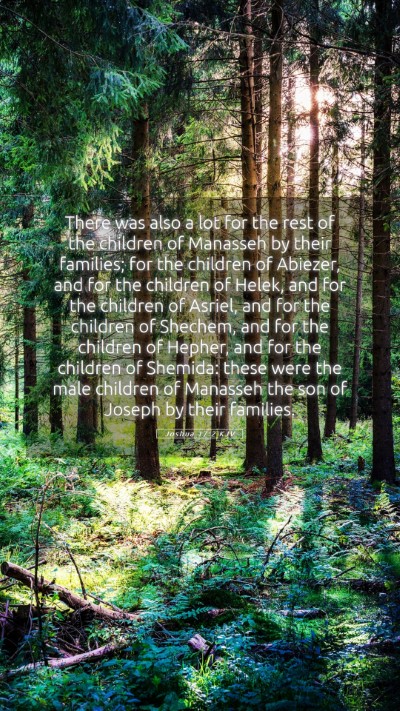Old Testament
Genesis Exodus Leviticus Numbers Deuteronomy Joshua Judges Ruth 1 Samuel 2 Samuel 1 Kings 2 Kings 1 Chronicles 2 Chronicles Ezra Nehemiah Esther Job Psalms Proverbs Ecclesiastes Song of Solomon Isaiah Jeremiah Lamentations Ezekiel Daniel Hosea Joel Amos Obadiah Jonah Micah Nahum Habakkuk Zephaniah Haggai Zechariah MalachiJoshua 17:2 Meaning
What is the meaning of Joshua 17:2?
There was also a lot for the rest of the children of Manasseh by their families; for the children of Abiezer, and for the children of Helek, and for the children of Asriel, and for the children of Shechem, and for the children of Hepher, and for the children of Shemida: these were the male children of Manasseh the son of Joseph by their families.
Joshua 17:2 Bible Verse Meaning
Understanding Joshua 17:2
Joshua 17:2 states: "There was also a lot for the rest of the children of Manasseh by their families; for the children of Abiezer, and for the children of Helek, and for the children of Asriel, and for the children of Shechem, and for the children of Hepher, and for the children of Micah: these were the male children of Manasseh the son of Joseph by their families." This verse is significant in understanding the distribution of land among the tribes of Israel, specifically the tribe of Manasseh.
Bible Verse Meanings
This passage touches upon multiple layers of Biblical history and cultural significance:
- Importance of Land Allotment: The allocation of land signifies God's promise to His people, fulfilling His covenant with Abraham, providing context for the rest of the narrative in Joshua.
- Tribal Identity: The listing of names emphasizes the importance of tribal lineage and identity in ancient Israel.
- Unity and Division: The mention of multiple families within the tribe reflects the complexities of unity and division within the larger community of Israel.
Bible Verse Interpretations
Commentators like Matthew Henry highlight that the families mentioned represent the diverse branches of the tribe of Manasseh, showing God's providence in ensuring that every family received their due inheritance.
Albert Barnes points out the significance of mentioning both the names and families, noting that this specificity points to the care and orderliness of God’s arrangement, ensuring that every segment of His people is acknowledged.
Adam Clarke elaborates that the details provided in such distributions serve as a reminder of the spiritual heritage established through these tribes, inviting readers to reflect on their own spiritual lineage derived from God's promises.
Understanding Scripture
To fully grasp the implications of Joshua 17:2, it's essential to consider both the historical context and the theological themes present:
- Historical Context: The land distribution occurred as the Israelites settled Canaan; the allocation process reflected God’s justice and grace in fulfilling His promises.
- Theological Implications: This chapter illustrates God’s sovereignty over Israel's inheritance, symbolizing the inheritance believers have in Christ.
In-depth Bible Verse Analysis
The careful enumeration of families within the tribe of Manasseh also serves to teach the importance of community and individual responsibility. Each family would be accountable for their part in upholding God’s laws and maintaining their inheritance.
Understanding the structure of the Israelite community can provide valuable insights for modern readers, encouraging them to consider their roles in community and faith.
Application of Bible Verses to Daily Life
In applying the meaning of this verse to personal life, one can reflect on:
- The significance of one's own heritage and the legacy of faith passed through generations.
- The responsibility to uphold spiritual values in one's family and community.
- The assurance that God provides for His people, just as He provided for the tribes of Israel.
Related Bible Cross References
- Genesis 48:20: Where Jacob blesses Joseph's sons, signifying their future in Israel.
- Numbers 26:29-34: A broader context of the census of the tribes of Israel, highlighting their division.
- Joshua 14:4: Describing how the land was divided among the tribes, providing direct relations to inheritance and allotment.
Conclusion
In conclusion, Joshua 17:2 is a vital passage for understanding the distribution of land among the tribes of Israel. It reflects God's faithfulness in fulfilling His promises and emphasizes the importance of each family within the broader community of faith. By studying and reflecting on such passages, believers can gain deeper insights into their own spiritual journeys and the communal aspects of faith that are foundational in Scripture.


